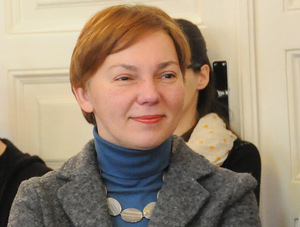Theatre Year contextually - conversation with Rasa Vasinauskaitė 7
In brief: With Theatre Day approaching and all the theatre community and fans in anticipation of Golden Stage Cross award ceremony (29th of March) it is worth talking about this theatre season. Theatre scholar Rasa Vasinauskaitė has been a member of the Golden Stage Cross commission for many years. This year's selection of winners is no exception. Therefore, it is worthwhile and valuable to ask and listen to her answers.
I was wondering how R. Vasinauskaitė saw this theatre year. According to the scholar, "This year was a jubilee year for some specific theatres, for example Kaunas State Drama Theatre celebrated its 95th anniversary, although it was also a professional Lithuanian and, more specifically, state theatre jubilee.
“Given the plays, their amplitude was very diverse - from aesthetically and "morally" outdated to unexpected and experimental, albeit in a quite moderate context. I would say, in a very Lithuanian context shaped by a few artists or theatres, who try to maneuver between wishes and possibilities."
I wanted to know whether the scholar noticed any innovations or tendencies in the general Lithuanian theatre context this year. "One of the worst and saddest tendencies of this year that I noticed, would probably be the growing amateur art. This has nothing to do with the fusion of "high" and "low" cultures; when I say amateur I mean superficiality, bad quality and inertia; doing things for the sake of doing, the randomness of measures, acting in clichés and stereotypes. Very often such amateurism is hidden under interactivity, efforts to provoke or shock and even under the relevant issues," says Rasa Vasinauskaitė.
I wanted to know how R. Vasinauskaitė would define the Lithuanian theatre of today. Scholar says that if she viewed it historically, she would say that theatre has always been and is closely related to social and cultural conditions. "Individual theatre development periods were strongly influenced by historical and cultural fractures, which - no matter how much he had wanted - human could not avoid. I think that our theatre of today is a little more shallow and superficial than, for example a decade or two ago. It no longer has the depth of human reflection, philosophy and metaphysics, which was available in the simple, yet extremely suggestive images."
I was interested to know what the scholar thinks of the younger generation of theatricals. R. Vasinauskaitė says that it is very diverse. "I cannot find any unifying denominator. I have already mentioned that sometimes young people seem aggressive, they need to somehow make themselves known to the world. But at the same time it seems like they all live in very different worlds. Today on the stage, young people do not talk about their feelings, love, anxiety or pains. They stopped talking about their experiences. Perhaps theatre for them has seized being the place in which one reveals his secrets and experiences."

